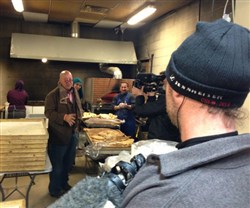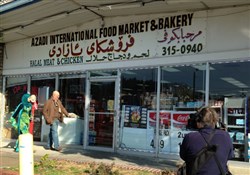VOL. 38 | NO. 3 | Friday, January 17, 2014
‘Bizarre’ host praises diversity of city’s food
By Jennifer Justus
When Andrew Zimmern, host of the Travel Channel’s “Bizarre Foods” and “Bizarre Foods America,” visited Nashville recently to shoot an episode of the show, the chef and three-time James Beard Award winner stopped by several Nashville favorites such as The Silly Goose, Martin’s Bar-B-Que Joint, Prince’s Hot Chicken Shack and Arnold’s Country Kitchen.
But as a man who crisscrosses the country to help viewers relate to foods that spring from immigrant life and modern American innovation, it also made sense that he paused to chat between sacks of basmati rice and bins of spiced nuts at Azadi International Food Market off Nolensville Road.
He had spent the morning in a private home with a Kurdish family making lamb dumplings before tasting flatbread at Azadi’s bakery.
Q: I’m glad you’re here, because you must know that we have a large Kurdish population?
A: “Oh yeah, it’s one of the first stories we built here. Ethnic stories of really vibrant communities are our bread and butter, so this was an easy thing to say yes to.’’
Q: Do you think your viewers will be surprised to learn that Nashville has the largest Kurdish population in the United States?
A: “I guarantee it. The rest of the world doesn’t know, and there are established Nashvillians, locals, who have lived here all their lives who have no idea this is here.’’
Q: As you’ve demonstrated in your show, food is a doorway into another culture…
A: “I use it as a lens, a tool through which to define a place, a people and a time.
“The thing that’s always very surprising for people is that a) you can do that, and b) how much you can learn from it.
“What this (Azadi market) says about America in 2013 and Tennessee in 2013 and Nashville in 2013, I think is very important.

Andrew Zimmern, host of the Travel Channel’s the “Bizarre Foods” series, samples lavash, a soft flatbread, at Azadi International Food Market and Bakery.
-- Jennifer Justus | Nashville Ledger “And like some of the food that we’ve seen in more contemporary-styled restaurants, it’s that new spirit in Nashville that is built on the old spirit in Nashville that allows for places like this to flourish.
“This is Music City USA, right? This is a place people come and fulfill their dreams, and people go to a bar, a club, a honky tonk, a friend’s house, throw someone’s (music) into the DVD or whatever and are willing to be accepting and experimental in music.
“It’s just ingrained in the culture here. You combine that with the Southern attitude of welcome, because there is a part of welcome especially with food, that’s very powerful here.
“Once you throw immigrant populations in … there [Nashville] or famous chefs from other cities like a Sean Brock, the population is very willing to be experimented at.
“They’re used to it. Their spirit of welcome and their attitudes about people who are wearing their hearts on their sleeves and putting themselves out there, Nashvillians are already there with that. It’s a pretty powerful thing.”
Q: This city is very collaborative, so do you expect to see more and more collaboration with contemporary restaurants and these types of places and ingredients?
A: “It’s happening right now … The behind-the-scenes sort of fun part of this is I have a lot of chef friends who follow me on Twitter and Instagram … We already showed some pictures of this (shop and bakery) to two chefs in town, two of the more well-known people in town, and they’re like, “When can I get there?”

Andrew Zimmern, host of the Travel Channel’s “Bizarre Foods America,” and Remziya Suleyman of Nashville enter Azadi International Food Market and Bakery for the camera.
-- Jennifer Justus | Nashville Ledger“It’s extremely exciting, and that’s also the magic of our program.
“Because six months from now when this episode airs, the same thing is going to happen to someone sitting on the couch in Cleveland.
“They’re gonna say, “That’s really awesome, we can go get tickets to a show, we can spend a weekend in Nashville and there are other things to do there besides go to the Titans game and listen to some great music and make a restaurant reservation. We can go explore cultures.”
Q: As a sort of professional explorer, what are your tips for Nashvillians who want to see other parts of the world from their hometown?
A: “Well, if you live here, it’s so easy because you have the advantage of time.
“So many folks say to me, “How can I do what you do?” And thanks to the Internet and the fact that Nashville isn’t the biggest city in the world, it’s easy to traverse by car.
“I think what happens is the natural human condition is ruled by a bunch of bad habits.
“One of which is practicing contempt prior to investigation. That doesn’t mean that people are contemptuous of Kurds.
“What it means is they’re contemptuous of the idea that I can stop, get out of my car and stick my nose into a place.
“I think remaining teachable and open to ideas and new things is extremely important. It’s how we grow, and I think it excites us.
“So here you have a bunch of Kurdish markets. Two doors down is a Mexican nightclub, I think.
“You come in here, and you can smell the dried mint and the tea. It’s so welcoming and beautiful, and there’s fruit – perfectly ripe persimmons, unlike American markets where they’re hard little baseballs.
“And as you look around at all the produce, you realize that these are things that Middle Easterners who live here devour.
“For food lovers who live here in Nashville, there are great herbs, five different types of pistachios, lemon-infused pistachios, one of my favorite Middle Eastern treats, are here in great abundance.
“And they’re not $30 a pound. They’re $5 a pound because they’re being provided to a community that goes through them right and left.
“There’s a yogurt drink with dill – one of my favorite things in the whole world.
“And before you even get to the magic of the bakery in the back with the cheese-stuffed bread – I mean, who doesn’t love cheese-stuff bread?
“They have several types of bread in the back being made by someone’s grandmother.
“When you get closer to the back, you can smell it. All you have to do is follow your nose.
“People want to find these bakeries or these hidden gems, but they’re not willing to get out of the car.
“Once you have a successful experience then you’re sold. But you can’t stay in the car.’’
Q: Having this [Azadi’s market] here is an asset to the Nashville food community, so how can we help foster that and help people who come here and start up a business?
A: “I think that what happens is that shows like this come out and chefs around town will start to discover these ingredients, these food techniques.
“And they’ll network with the butcher here about how a certain type of lamb is cut.
Q: They’ll experience the bread, and then it starts to roll out much the way pimento cheese is now the most popular thing in New York City and Los Angeles.
“I mean, 15 years ago chefs in New York and Los Angeles couldn’t tell the difference between pimento cheese and a pimento-stuffed olive. It’s different now.’’